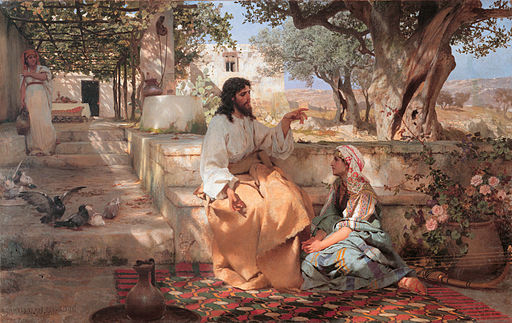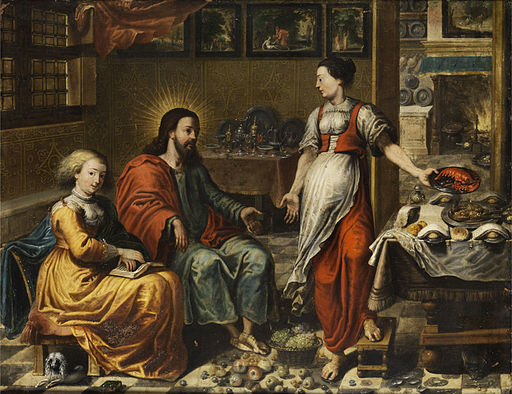 |
Maybe Martha could cook (again, a simple meal) and Mary could do all the dishes and clean up so Martha could recline at table afterward?
Perhaps Mary and Martha should have more open lines of communication between each other. That fact that Martha resorts to shaming her in front of Jesus and everyone else shows that they didn't discuss the big event before it was upon them. Though, maybe Jesus's arrival was a bit of a surprise.
Of course, everyone wants to be the Mary of the story. But she's not exactly blameless. Still, Jesus doesn't blame her. He diagnoses Martha as "worried and distracted by many things." Yet, it's hard not to be concerned when your guest list is out the door and there's too few cooks in the kitchen. Would it have been righteous to serve dinner late or not at all?
Or is it OK to ask Jesus to perform miracles that don't need to be performed like "Please feed this full house without me having to slave alone in the hot kitchen even though I could do it and have always done it?" Feeding the 5,000 + women and children with a fish sandwich is a worthy request, but what about "God, can you please make my life simpler so I can have the energy to obey you? So I have time to pursue my dream of writing children's books for 30 minutes a day? So I can spend time in trying out new prayer exercises each morning?
Even as I write, I'm very near to all my own worries and distractions. I don't want to lash out at others who don't exhibit the same vulnerability to these pressures as I do. But I also don't know how to manage my practical responsibilities (real or perceived) without forfeiting "the one thing," the "better part."
How do I choose that better part. Is it my turn to choose it? I want to be a Mary- shedding gender roles and other's expectations to just bask in the creative glow of communion with my Jesus. If Martha was indignant, "Lord, do you not care?" --what must the disciples thought about little Mary auditing their class with the Master? But then how will we eat? How will I obey in all the little things, some of which happen to be feeding three little mouths and two big ones?

Is the answer merely in better communication between myself as a Martha-type and whoever happens to be my Mary-counterpart? Cuz, honestly, as this little drama unfolds in my head, it's not Martha, Mary and Jesus. It's me, my better half and "free" time. No. Let's call it quality "me" time.
Yikes. Does that mean I long for "me" more than Jesus? I'm gonna give myself the benefit of the doubt here, seeing as at the moment, "me" time is actually time interacting, trying to interact with Jesus. And that refocuses me. I pray He'd teach me to choose the better part when its mine for the choosing. There must be a choice, right? There must be points at which I can choose one part or the other. But if it's a part of the whole, does that automatically mean someone's gotta take the worse part? Is it really a closed system, a limited economy? Does one get Jesus and the other suffers? One's rich and the other's poor. I don't think that's the God in whom I believe.
It circles be back to the idea of sharing responsibilities and benefits.
And Jesus, what did you mean when you said that "better part" would "not be taken away from her"? Is it simply that you refused to shame Mary as her big sister was? Or, ever the double entendre wielding prophet, where You saying that the "part" or choice and path Mary took was life-imparting, so that some element of the divine was being inwrought in a way that couldn't be taken from her, just as we can never be separated from God's love?
Now back to Martha. The story makes me think Martha is the oldest. I see Lazarus and Mary as the younger siblings because when Jesus arrives on the doorstep of his favorite place in Bethany, "Martha welcomed into her home." She might not have been the breadwinner, but she certainly seems to be the matriarch of the house. She wasn't even really concerned that she was missing out on Jesus. She was upset because she wanted to lavish this huge feast on Him and everyone watching. She was probably a gifted hostess. But she needed to really outdo herself, and that involved more than herself. I'm sure I've felt this so many times. She's so at home with her self pity. She was upset because Mary was, in her mind, supposed to be more interested in food prep than gobbling up God's word.
Jesus gave Martha a personalized "word of wisdom" when she confronted both Jesus (for lack of concern over her plight) and Mary (for lazing around with the the men). As an aside, despite all her apparent social bumbling in this story, I have to admire the level of intimacy Martha has with Jesus. You have to be close to chide the Messiah. "Martha, Martha!" He calls her by name, as if to shake her out of an obsession, "You are worried and distracted by many things; there is need of only one thing."
So. What is the "one thing"? Is it the same as Mary's "better part"? Is one thing simply to still oneself and sit and listen to what Jesus is saying? I don't have certain answers. Just more questions. What would have happened if nobody cooked? What would Jesus have said or done? Would both sisters have a part of the better part? Would Jesus have whipped up a miracle meal or have directed his disciples to procure one from a mysterious source? What are your thoughts on this story, and how do you apply Jesus's words to Martha?







No comments:
Post a Comment